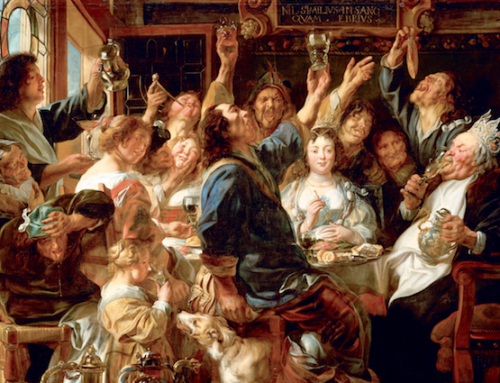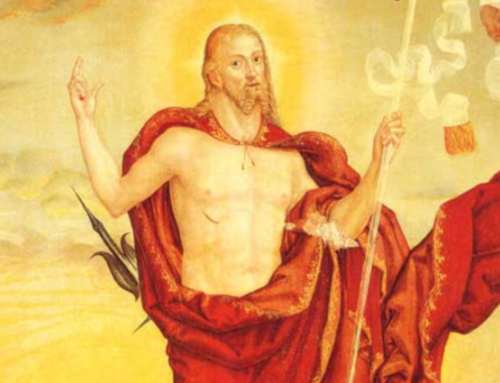 “The Pursuit of Happiness.” It is an indelible line signaling one of the three inalienable rights identified by the Founding Fathers when they framed the Declaration of Independence in 1776. It echoes down the generations of American society in ever distorted waves. In this land, the very definition of happiness is now almost universally understood to mean the very opposite of what such a cheerful word ought to signify. We find ourselves in a time of unprecedented material riches. We might notice that we often get what we wish for, but our present collective desires lead to the contrary of the truthful and ancient expositions of what satisfies the deepest longings of the human soul. We find ourselves in a vicious cycle of appetitive slavery shortly after we embark on the mad quest for material and emotive contentment. What is it that truly makes us happy?
“The Pursuit of Happiness.” It is an indelible line signaling one of the three inalienable rights identified by the Founding Fathers when they framed the Declaration of Independence in 1776. It echoes down the generations of American society in ever distorted waves. In this land, the very definition of happiness is now almost universally understood to mean the very opposite of what such a cheerful word ought to signify. We find ourselves in a time of unprecedented material riches. We might notice that we often get what we wish for, but our present collective desires lead to the contrary of the truthful and ancient expositions of what satisfies the deepest longings of the human soul. We find ourselves in a vicious cycle of appetitive slavery shortly after we embark on the mad quest for material and emotive contentment. What is it that truly makes us happy?
There are at least three distinct categories of “happiness” that call for examination in this unhappy age. Modern notions of happiness are reductive, cut off from considerations of the soul, virtues, and vices, and cut off from an objective standard. Modern happiness is sought almost exclusively in the physical, material, and emotive realms of existence. Secondly, there is the category of happiness finding its full countenance in the Ancient Greek conception of the “good life,” achieved by the cultivation of excellence in the virtues. Finally, there is the Christian ideal of happiness called beatitude whose fullest expression is embodied in the life and teachings of Christ the Logos.
Modern Happiness
Our modern English word happiness finds its roots in the Old Norse tongue and signifies “luck” or “chance.” Its Old English derivation “heapic” indicated “equal.” It just may satisfy our modern sensibilities to consider happiness an artifact of luck guaranteed by governmentally imposed “equality.” In these times of material reductionism, there is little else to satisfy our lowest impulses but filthy lucre, sex, food, drink, video games, and personal rights. Fleeting contentment best serves our modern idea of happiness.
Confucius said “a wise man seeks virtue, a fool seeks comfort.” Modern happiness is a slogan for fools singing the praises of material riches, comfort-seeking, and satiation of the appetites. The list of things that make us happy in this age are hardly the things comprising an honorable posterity. If we were to run across a friend who was grinning from ear to ear, what is the first thing to which we might attribute his apparent felicity? We might first think perhaps that he has won the lottery, or worse.
Our modern conceptions of happiness bombard our senses like the siren’s song. The calls to satisfy our basest wants permeate the very air we breathe; they undergird lessons we are taught by the schools, the messages conveyed by the mass media, the therapy delivered by psychologists. Most tragically, they are modeled by too many families trying to “keep up with the Joneses.” We are taught from the nursery to succumb to our appetites and seek gratification from the lowest and most temporary things by any means necessary. We are encouraged to carry on the insatiable quest to the grave: “He who dies with the most toys wins!”
Ancient Greek Happiness
By stark contrast, a definition of happiness that speaks truly to real natural human ends comes from the Ancient Greeks who called it “eudaimonia” (εὐδαιμονία). Eudaimonia is three part word begins with “eu” meaning good, followed by “daimon” meaning having to do with the spirit, not the body, and ending with “ia” indicating a perpetual state. The Greeks understood that to find happiness was to seek after and cultivate excellence in the virtues and by so doing to live the good life that leads to happiness, a type of happiness that is spiritual and lasting. The good life was not that of riches and attainment, but that of excellence in virtue in the properly formed character.
Aristotle outlined the specific virtues that lead a man to the good life in his Nicomachean Ethics. They are called the Cardinal Virtues—cardinal meaning “hinge.” These are the virtues upon which the door to the good life hangs. The queen of the cardinal virtues is wisdom, which guides courage, justice and moderation. These four virtues clash incompatibly with America’s modern virtues of liberty (an inverted form leading generally to slavery) which guides bastardized forms of tolerance, equality, and rights.
An understanding of happiness in alignment with the Ancient Greeks satisfies many human longings that reside much deeper than mere appetites. Our true human ends are found in the habits of virtue, not in the habits of material acquisition. A society that seeks excellence in the virtues has the potential to grow into an edifying and prosperous civilization as is evidenced by world history, especially the Great Western Tradition.
Christian Happiness
Where Jerusalem and Athens meet we find the highest ideal of happiness in the Christian notion of beatitude. Christ Himself is the perfect model of the deepest and truest human fulfillment. St. Augustine said in his spiritual masterpiece The Confessions that “our hearts are restless until they rest in thee.” As an augmentation of the Greek happiness that rests in the habits of excellence in virtue, the Christian notion also seeks the Creator of the Virtues in a more complete embrace of reality and a deeper acquisition of the highest virtues by resting not in our own contentment, but in the very Will of the Creator.
The Christian ideal of blessedness delineated by the Beatitudes taught to us by Christ himself in the Sermon of the Mount subsumes and perfects the Greek notion of eudaimonia. The Greek virtues are an excellent platform to develop a mastery over the self that is required to begin to prepare for the three theological virtues explicated by Saint Paul—the virtues of Faith Hope and Love. Unlike the Cardinal virtues, which require arduous work to cultivate, the three theological virtues in their highest manifestations are infused as gifts of the Holy Spirit, poured into obedient and faithful souls.
The Christian ideal of blessedness indicates the state of rest that follows the perfection of the Christian virtues. Not by the work of individual moral agency, but by the gratuitous work of the Holy Spirit gifted to souls submissive to the Will of the Creator. The splendor of the Beatitudes lived out to its fullest is no less than the ascent to full communion with the saints. St. Thomas Aquinas refines the moral end of living out the Beatitudes as the highest form of happiness by explaining that “to possess God in full in the beatific vision is to have our powers fully realized, fully perfected, and to find them at rest, in perfect happiness for all eternity.” This happiness is the pinnacle of perfection and the highest form of fulfillment towards which we mere mortals can strive.
The Christian ideal of blessedness is the very opposite of the temporary material contentment we seek in America. American pleasure seekers find the Christian notion revolting because the way of the cross is repellent and off-putting to those enmeshed in the vain pursuit of comfort by cultivating vice to maximize pleasure and minimize pain. But the way of the cross meets our deepest human ends and makes us saints, while the modern American pursuit of happiness sees us end in becoming narcissistic gluttons, no matter how genteel a face we put on it.
Final Ends
The kind of happiness a society pursues is a foundational determinant of what kind of civilization it will become. In the United States today, our cultural icons, teachers, and mind-molders insist that happiness means that everyone has the right to possess whatever it is that will make them “happy.” This very notion, cut off from all ethical considerations of virtues and vices, is a most effective recipe for societal disaster. The truth of this assertion is played out on the front pages of every newspaper and magazine in the nation every single day.
It is an enlightening paradox to consider how the modern definition of happiness, in which each individual invents his own reality, and proclaims his own summum bonum without reference to an objective standard, turns out to be uniform, banal, and mundane. Bread and circuses, sex, drugs, and rock-n-roll, money and possessions, are the invariable objects of American happiness. The formulae may vary but not the objects, and neither do the results: that of a wretched slavery to the appetites. We pride ourselves on our radical individualism but end as an “independent-minded herd.”
By contrast consider the Christian ideal of happiness in which the sole subject, the Logos, is singular, universal and uniform. Yet the saints radiate a diversity of mode and manifestation of the Christian virtues in a splendid and colorful array displaying the vast range of human variety in each unique human soul compared to the drab gray of the seething masses exercising their rights in a univocal monotone. To stay the present course concretizes the suicide of the West. A return to the Ancient Greek definition of happiness alone would steady the great capsizing American ship. An embrace of the Christian ideal of beatitude would radically transform the world. What makes you happy?
This is the final essay in a three-part series on the idea of happiness. The first two essays may be found here and here. Books on the topic of this essay may be found in The Imaginative Conservative Bookstore.







Making matters more confusing, polls are unreliable when admitting to unhappiness or disstisfction is, especially in America, confessing to having failed at life. Somehow the right to pursue happiness has come to mean obtaining it because, after all, anyone in America can purportedly achieve anything if he or she tries hard enough! Admitting that happiness eluded you due to Fate tells your neighbours that you’re a loafer. This cultural lie explains why so many Americans seek clinical excuses for unhappiness, which are sometimes also lies.